|
|
|
|
|
|
|
|
|
|
|
|
|
|
|
|
|
|
|
|
|
|
|
|
|
|
|
|
|
|
|
|
|
|
HANNOVER FAIR 1995 - 2019
 HANNOVER FAIR 2019 HANNOVER FAIR 2019
 HANNOVER FAIR 2018 HANNOVER FAIR 2018
 HANNOVER FAIR 2017 HANNOVER FAIR 2017
 Arno's Forum Interview 2017 Arno's Forum Interview 2017
 HANNOVER FAIR 2016 HANNOVER FAIR 2016
 HANNOVER FAIR 2015 HANNOVER FAIR 2015
 HANNOVER FAIR 2014 HANNOVER FAIR 2014
 HANNOVER FAIR 2013 HANNOVER FAIR 2013
 HANNOVER FAIR 2012 HANNOVER FAIR 2012
 HANNOVER FAIR 2011 HANNOVER FAIR 2011
 HANNOVER FAIR 2010 HANNOVER FAIR 2010
 Arno's
Forum Interview 2010 Arno's
Forum Interview 2010
 HANNOVER FAIR 2009 HANNOVER FAIR 2009
 Arno's Video during HF 2009 Arno's Video during HF 2009
 Arno's Forum Interview 2009 Arno's Forum Interview 2009
 HANNOVER FAIR 2008 HANNOVER FAIR 2008
 Arno's Forum Interview 2008 Arno's Forum Interview 2008
 HANNOVER FAIR 2007 HANNOVER FAIR 2007
 Arno's Forum Interview 2007 Arno's Forum Interview 2007
 HANNOVER FAIR 2006 HANNOVER FAIR 2006
 Daily Networking evenings Daily Networking evenings
 HANNOVER FAIR 2005 HANNOVER FAIR 2005
 Daily Networking evenings Daily Networking evenings
 International
Commercial Visitors 2005 International
Commercial Visitors 2005
 HANNOVER FAIR 2004 HANNOVER FAIR 2004
 International
Commercial Visitors 2004 International
Commercial Visitors 2004
 HANNOVER FAIR 2003 HANNOVER FAIR 2003
 International
Commercial Visitors 2003 International
Commercial Visitors 2003
 HANNOVER FAIR 2002 HANNOVER FAIR 2002
 HANNOVER FAIR 2001 HANNOVER FAIR 2001
 HANNOVER FAIR 2000 HANNOVER FAIR 2000
 HANNOVER FAIR 1999 HANNOVER FAIR 1999
 HANNOVER FAIR 1998 HANNOVER FAIR 1998
 HANNOVER FAIR 1997 HANNOVER FAIR 1997
 HANNOVER FAIR 1996 HANNOVER FAIR 1996
 HANNOVER FAIR 1995 HANNOVER FAIR 1995
|
| |
| Visits and Workshops |
 |
 Hans-Olof Nilsson's Off-The-Grid Hydrogen House near Goteborg, Sweden Hans-Olof Nilsson's Off-The-Grid Hydrogen House near Goteborg, Sweden |
 |
 Visit at the Italian demonstration plant of MagneGas™ on February 7th and 8th, 2011 Visit at the Italian demonstration plant of MagneGas™ on February 7th and 8th, 2011 |
 |
 Hydrogen Plant of Emirates Industrial Gases Co. Ltd ( EIGC) at Dubai, UAE Hydrogen Plant of Emirates Industrial Gases Co. Ltd ( EIGC) at Dubai, UAE |
 |
 Huerta Solar en Tabernas, Spain, October 2009 Huerta Solar en Tabernas, Spain, October 2009 |
 |
 Andasol, Spain, October 2009 Andasol, Spain, October 2009 |
 |
 Antares DLR H2, Stuttgart, Germany,
September 2009 Antares DLR H2, Stuttgart, Germany,
September 2009 |
 |
 German Aerospace Center (DLR) Deutsches Zentrum für Luft-und Raumfahrt eV, Stuttgart, Germany, Institute of Technical Thermodynamics (ITT) Institute of Vehicle Concepts Stuttgart, Germany, June 2009 German Aerospace Center (DLR) Deutsches Zentrum für Luft-und Raumfahrt eV, Stuttgart, Germany, Institute of Technical Thermodynamics (ITT) Institute of Vehicle Concepts Stuttgart, Germany, June 2009 |
 |
 Brennstoffzellen-Boote für den Freizeitbereich, Hochschule Konstanz, Konstanz, Germany June 2009 Brennstoffzellen-Boote für den Freizeitbereich, Hochschule Konstanz, Konstanz, Germany June 2009 |
 |
 AFCC Automotive Fuel Cell Cooperation, Burnaby, BC, Canada June 2009 AFCC Automotive Fuel Cell Cooperation, Burnaby, BC, Canada June 2009 |
 |
 Powertech Labs Inc., a: "... wholly owned subsidiary of BC Hydro (a Crown corporation of the Government of British Columbia), Surrey, BC, Canada June 2009 Powertech Labs Inc., a: "... wholly owned subsidiary of BC Hydro (a Crown corporation of the Government of British Columbia), Surrey, BC, Canada June 2009 |
 |
 Plataforma Solar de Almería, Spain Plataforma Solar de Almería, Spain |
|
| Observations |
 |
 How Airbus conquered the How Airbus conquered the
US market in the 70s |
 |
 The Arecibo Observatory The Arecibo Observatory
Arecibo, Puerto Rico |
 |
 Hat Creek Radio Observatory, Hat Creek Radio Observatory,
Hat Creek, CA, USA |
 |
 National Radio Astronomy Observatory, Green Bank, WV, USA National Radio Astronomy Observatory, Green Bank, WV, USA |
 |
 Wright Brothers National Memorial, Kitty Hawk, NC, USA Wright Brothers National Memorial, Kitty Hawk, NC, USA |
 |
 Fuel Cell Bus Trial, Perth, Australia Fuel Cell Bus Trial, Perth, Australia |
 |
 California Hydrogen Highway, USA California Hydrogen Highway, USA |
 |
 SPACEFEST 2009, San Diego, USA SPACEFEST 2009, San Diego, USA |
|
| Impressions from worldwide Conferences, which
we attended to promote the commercialisation of Hydrogen and Fuel
Cells: |
| 2022 |
| #117 |
2nd Edition of International
Conference on
Green Chemistry and Renewable Energy |
| 2020 |
| #116 |
2020 6th International 
Conference on Environment and Renewable Energy (ICERE 2020), 24-26 February 2020, Hanoi, Vietnam |
| 2019 |
| #115 |
4th Annual ASEAN Solar + 
Energy Storage Congress & Expo 2019 14- 15 Nov, 2019 The Bellevue Manila, Philippines |
| #114 |
SFERA-III 1st Summer School &
Doctoral Colloquium at CNRS-PROMES in Odeillo, France
September 9th-13th, 2019 |
| #113 |
Starmus V, June 24 – 29, 2019
Zurich, Switzerland a global festival of science communication and art |
| 2018 |
| #112 |
Visit to NOORo I to III in 
Ouarzazate, Morocco as part of the SolarPACES 2018 conference, October 6, 2018 |
| #111 |
The Hydrogen Energy Summit 
2018 Chiang Mai, Northern Thailand Arno's presentation: Off the Grid – Unveiling new ways for our Energy supply January 26, 2018 |
| 2015 |
| #110 |
1. Klimaschutzkongress auf der 
Insel Sylt
25. September 2015
Vortrag von Arno A. Evers:
Eine „Insel- Lösung“ für Sylt?
Neue Wege zur Energieversorgung der Insel Sylt |
| 2014 |
| #109 |
6. Hamburger Klimawoche 
29. August 2014
Vortrag von Arno A. Evers:
Physikalische und Gesellschaftliche Rahmenbedingungen der Energiewende010 |
| 2012 |
| #108 |
MesseKongress RegioEnergie+++  Dreieich 2012 Dreieich 2012
9. September 2012
Vortrag von Arno A. Evers: Sind wir noch zu retten? |
| 2010 |
| #107 |
WREC World Renewable Energy Congress XI
September 25-30, 2010 
Abu Dhabi, United Arab Emirates
Oct 2010 |
| #106 |
18th World Hydrogen Energy Conference WHEC 2010,
May 16 - 21 
Essen, Germany
Jun 2010 |
| 2009 |
| #105 |
"Bright
Horizons 6" -
A Journey
to the Edge of the Cosmos 
Eastern Caribbean
Dec 2009 |
| #104 |
2009 Fuel Cell Seminar & Exposition
Palm Springs, CA, USA
Nov 2009 |
| #103 |
Fuel Cell Technologies:
FUCETECH 2009
Mumbai (Bombay), India
Nov 2009 |
| #102 |
f-cell
Stuttgart, Germany
Sep 2009 |
| #101 |
SolarPACES 2009
Berlin, Germany
Sep 2009 |
| #100 |
5th Annual Hydrogen Implementation Conference
Charleston, WV, USA
Aug 2009 |
| #99 |
Intersolar North America
San Francisco, CA, USA 
Jul 2009 |
| #98 |
European FUEL CELL FORUM 2009
Lucerne, Switzerland 
Jun 2009 |
| #97 |
HFC2009
Vancouver, Canada 
Jun 2009 |
| #96 |
telescon 2009
Vienna, Austria 
May 2009 |
| #95 |
Hydrogen Works
San Diego, CA, USA 
Feb 2009 |
| #94 |
ICEPAG 2009
Newport Beach, CA, USA 
Feb 2009 |
| 2008 |
| #93 |
HTE-HI.TECH.EXPO 2008
Milan, Italy 
Nov 2008 |
| #92 |
Fuel Cell Seminar & Exposition
Phoenix, AZ, USA 
Oct 2008 |
| #91 |
H2Expo
Hamburg, Germany 
Oct 2008 |
| #90 |
f-cell
Stuttgart, Germany 
Sep 2008 |
| #89 |
INTELEC 2008
San Diego, CA, USA
Sep 2008 |
| #88 |
2008 Formula Zero Championship
Rotterdam, The Netherlands
Aug 2008 |
| #87 |
HyForum 2008
Changsha, P.R. China
Aug 2008 |
| #86 |
WREC X 2008
Glasgow, Scotland, UK
Jul 2008 |
| #85 |
KMCM 2008
Vancouver, BC, Canada
Jul 2008 |
| #84 |
Lucerne FUEL CELL FORUM 2008 
Lucerne, Switzerland
Jun 2008 |
| #83 |
17th World Hydrogen
Energy Conference (WHEC) 
Brisbane, Australia
Jun 2008
 The role of the young generation ... The role of the young generation ... |
| #82 |
Renewable Energy Asia
Bangkok, Thailand 
Jun 2008 |
| #81 |
Selected Hydrogen Fueling Stations in California, USA 
Apr 2008 |
| #80 |
NHA Annual Hydrogen Conference 2008
Sacramento, CA, USA
Mar / Apr 2008 |
| #79 |
FC EXPO 2008 
Tokyo, Japan
Feb 2008 |
| #78 |
Der 4. Deutsche Wasserstoff 
Congress 2008
Essen, Germany
Feb 2008 |
| #77 |
ISEPD 2008 
Changwon, Korea
Jan 2008 |
| 2007 |
| #76 |
20TH World Energy Congress & Exhibition 
Rome, Italy
Nov 2007 |
| #75 |
World Hydrogen Technologies Convention (WHTC) 
Montecatini Terme, Italy
Nov 2007 |
| #74 |
2007 Fuel Cell Seminar & Exposition
San Antonio, Texas, USA
Oct 2007 |
| #73 |
KOREA ENERGY SHOW 2007 
Seoul, Republic of Korea
Oct 2007 |
| #72 |
Tenth Grove Fuel Cell Symposium 
London, UK
Sep 2007 |
| #71 |
Solar Tech India 2007 
New Delhi, India
Sep 2007 |
| #70 |
SES-Fachtagung
MYTHOS STROMLÜCKE 
Zurich, Switzerland
Aug 2007 |
| #69 |
HFCE 2007 
Shanghai, P.R. China
Jul 2007 |
| #68 |
IHEC 2007 
Istanbul, Turkey
Jul 2007 |
| #67 |
KMCM 2007 
Düsseldorf, Germany
Jul 2007 |
| #66 |
Kick Off Meeting zur Leitinnovation Mikrobrennstoffzelle 
Munich, Germany
Jun 2007 |
| #65 |
Hydrogen and Fuel Cells 2007: International Conference &
Trade Show
Vancouver, BC, Canada
April / May 2007 |
| #64 |
GENERA - Energy and Environment International Fair 
Madrid, Spain
Feb / Mar 2007 |
| #63 |
World Renewable Energy Congress [WREN] 
Fremantle, Australia
Feb 2007 |
| #62 |
Environment 2007
Exhibition & Conference 
Abu Dhabi, UAE
Jan 2007 |
| 2006 |
| #61 |
2nd Annual Fuel Cells Durability & Performance 2006 
Miami Beach, FL USA
Dec 2006 |
| #60 |
EDTA Conference & Exposition 
Washington, DC, USA
Nov 2006 |
| #59 |
The Fuel Cell Seminar 
Honolulu, Hawaii, USA
Nov 2006 |
| #58 |
Fraunhofer Symposium
Mikroenergietechnik
POWER TO GO
Berlin, Germany
Oct 2006 |
| #57 |
Renewables to Hydrogen Forum 
Albuquerque, NM, USA
Oct 2006 |
| #56 |
Alternative Transport Energies Conference 
Perth, Western Australia
Sep 2006 |
| #55 |
Power-Gen Asia 
Hong Kong, Hong Kong
Sep 2006 |
| #54 |
World Renewable Energy
Congress IX and Exhibition 
Florence, Italy
Aug 2006 |
| #53 |
R&D in the field of Hydrogen and Fuel Cell in Germany and Europe 
Clausthal, Germany
Jul 2006 |
| #52 |
Lucerne Fuel Cell Forum 2006 
Lucerne, Switzerland
Jul 2006 |
| #51 |
16th World Hydrogen Energy Conference (WHEC) 
Lyon, France
Jun 2006 |
| #50 |
NHA Annual Hydrogen Conference 
Long Beach, CA, USA
Mar
2006 |
| #49 |
FC
EXPO 2006
Tokyo, Japan
Jan 2006 |
| #48 |
Wasserstoff und Brennstoffzellen im Automobil
Essen, Germany
Apr 2006 |
| 2005 |
| #47 |
Fuel
Cell Seminar
Palm Springs, USA
Nov 2005 |
| #46 |
Internationale
ASUE-Fachtagung
Essen, Germany
Nov 2005 |
| #45 |
EHEC
2005
Zaragoza, Spain
Nov 2005 |
| #44 |
Fuel
Cell Summit:
A Road Map to Commercialization
Uncasville, CT, USA
Oct 2005 |
| #43 |
2005
Grove Fuel Cell Symposium
London, UK
Oct. 2005 |
| #42 |
WHTC
2005 World Hydrogen Technologies Convention (WHTC) Singapore, Singapore
Oct. 2005 |
| #41 |
f-cell
2005, Stuttgart, Germany
Sep. 2005 |
| #40 |
The
27th International Telecommunications Energy Conference - intelec
'05
Berlin, Germany
Sep. 2005 |
| #39 |
IHK
Nord Wasserstoff – Tagung
Lübeck, Germany
Sep. 2005 |
| #38 |
ICHS
- International Conference on Hydrogen Safety , Pisa, Italy
Sep. 2005 |
| #37 |
IHEC-2005
International Hydrogen
Energy Congress & Exhibition
Jul. 2005 |
| #36 |
93.
Bunsen Kolloquium
Jun. 2005 |
| #35 |
European
Hydrogen and Fuel Cell Technology Platform (HFP)
Brussels, Belgium
Mar. 2005 |
| #34 |
Cairo
9th International Conference on Energy & Environment
Sharm El-Sheikh, Egypt
Mar. 2005 |
| #33 |
1st
International Fuel Cell Expo
Tokyo, Japan
Jan. 2005 |
| 2004 |
| #32 |
H2PS:
The 2004 Hydrogen Production and Storage Forum,
Washington, DC, USA
Dec. 2004 |
| #31 |
Impressions
from Shanghai
Nov. 2004 |
| #30 |
Renewable Energies China incl. Hydrogen + Fuel Cells
Shanghai, PR China
Nov. 2004 |
| #29 |
Michelin
Challenge Bibendum 2004
Oct. 2004 |
| #28 |
Energy
Asia 2004
Oct. 2004 |
| #27 |
Hydrogen
and Fuel Cells 2004
Conference and Trade Show
Toronto, ON, Canada
Sep. 2004 |
| #26 |
Meetings
in Singapore,
Sep. 2004 |
| #25 |
Hydrogen
and Fuel Cell Futures Conference, Perth, Australia
Sep. 2004 |
| #24 |
Exhibiting
at World Renewable Energy Congress VIII
Denver, CO, USA
Sep. 2004 |
| #23 |
Arno
presenting at ACS National Meeting Philadelphia, PA, USA
Aug. 2004 |
| #22 |
Promotion
of FP6, for European Union, Delegation of the European Commission,
Shanghai
Jul. 2004 |
| #21 |
IHK
Energy-Podium 2004
Jul. 2004 |
| #20 |
15th
World Hydrogen Energy Conference (WHEC15)
Yokohama, Japan
Jun. 2004 |
| #19 |
Impressions
from the
Energy Forum 2004
Varna, Bulgaria
Jun. 2004 |
| #18 |
Impressions
from HYFORUM
May 2004 |
| #17 |
Impressions
from Dubai
United Arab Emirates
May 2004 |
| #16 |
Impressions
from Argentina
May 2004 |
| #15 |
Promoting
Hydrogen Production from Patagonia, Argentina
May 2004 |
| #14 |
Impressions
Zhuozheng Garden
in Su Zhou
Mar. 2004 |
| 2003 |
| #13 |
H2PS:
The 2003 Hydrogen Production and Storage Forum
Washington, D.C., USA
Dec. 2003 |
| #12 |
Impressions
from
Washington, D.C., USA
Dec. 2003 |
| #11 |
Shanghai
International Industry Fair (SIF), Shanghai, P.R. China
Nov. 2003 |
| #10 |
Energy
Asia 2003
PTC Asia 2003
CeMAT Asia 2003
Factory Automation Asia 2003
Shanghai, P.R. China
Nov. 2003 |
| #9 |
2003
WATER KOREA
Nov. 2003 |
| #8 |
NESC
2003 - 6th Int'l Conference on New Energy Systems & Conversions
Nov. 2003 |
| #7 |
Impressions
from Busan
South-Korea
Nov. 2003 |
| #6 |
2003
Fuel Cell Seminar
Miami Beach, Florida, USA
Nov. 2003 |
| #5 |
Impressions
from Shanghai, Beijing, P.R. China
Nov 2003 - Jul. 2004 |
| #4 |
f-cell
forum, Stuttgart, Germany
Sep. 2003 |
| #3 |
Hypothesis
V, Porto Conte, Italy
Sep. 2003 |
| #2 |
1st
European Hydrogen Energy Conference, Grenoble, France
Sep. 2003 |
| #1 |
Cooperation
for Energy Independence of Democracies in the 21st Century
Jerusalem, Israel
Aug. 2003 |
|
 |
 |
 |
 |
Shanghai International
Industry Fair (SIF) 2004
|
 |
|
 |
| Corporate
Information |
| home |
|
|
| |
4th International Conference,
Tuesday, April 12, 2005
"Hydrogen + Fuel Cells
on their way to commercialisation"

Hydrogen and Fuel Cells (H2/FC) technologies
have been on worldwide probation for the last
30 years. Billions of US $ – financed
privately and from Governmental funds - have
already been invested. However, in some key
markets, H2/FC applications have been made and
real systems used to meet the demand for cleaner,
more practical energy solutions. Fuel Cells
are on the verge of being introduced commercially,
revolutionizing the way we presently produce
electricity.
At this conference, international industry
leaders and executives from seven countries
gave their insight on the commercialisation
results and future aspects in their particular
regions. All conference attendees had the opportunity
to learn more about different innovative approaches
that are already under way or are still in the
making. As a special feature, each presentation
was concluded with a 10-minute discussion between
the speaker and the audience.

As part of the programme, delegates had the
unique opportunity to visit the presently worldwide
largest commercial and most international Group
Exhibit for Hydrogen and Fuel Cells in Hall
13, just minutes away from the conference centre.
All conference participants witnessed live demonstrations
and newly developed, launched, or updated products.
Afterwards, delegates dined together at a at
a special Networking evening in the middle of
the Hydrogen + Fuel Cells exhibition. They met
with international H2/FC industry leaders and
executives, using the opportunity to exchange
views with key individuals.

Conference program April 12, 2005:
| Moderated
by: |
Ulrich
Walter, Moderator
Team
Arno A. Evers FAIR-PR, Germany |
10.00-10.30 a.m.

|
Introduction,
Presentation of all speakers
Ulrich Walter, Moderator
Arno A. Evers
FAIR-PR, Germany
|
| |
|
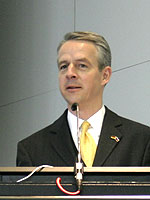 |
Words of Welcome
I
Peter Rippen, Deutsche Messe AG, Germany
|
| |
|
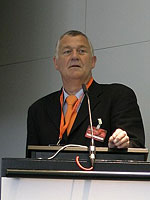 |
Words of Welcome
II
Arno A. Evers, Owner and Operator
Arno A. Evers
FAIR-PR, Germany
"I appreciate and admire
the work of all those thousands of researchers,
engineers and designers who work on the
future of Hydrogen and Fuel Cells, however,
maybe we all together need a little more
creativity and fantasy to come to real
mass market products and services for
the end-users worldwide!" |
| |
|
10.30-10.50 a.m.
 |
Future Prospect of
Mobile Fuel Cell
Dr.
Seok Yeol Yoon
CTO and Executive Vice President
Samsung
SDI Co., Ltd., Seoul, Korea |
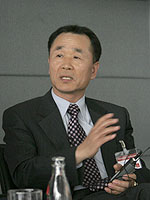 |
"The ubiquitous
use of tomorrow's powerful mobile phones
will not be limited by information technology,
but by battery capacity.
Even if today's lithium-ion batteries'
capacity could be doubled, they would
not meet future demands.
Samsung, as a global leader in "Digital
Convergence", therefore focuses on
the development of mobile Fuel Cells."
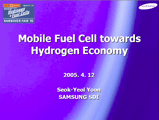
Click here
to download the presentation and more
information about Dr. Seok Yeol Yoon
|
| |
|
|
| 10.50-11.00 a.m. |
Discussion |
| |
|
11.00-11.20 a.m.
 |
China’s hydrogen &
fuel cells energy policies and strategies
Mr. Shi Dinghuan
Consultant of the State Council of China,
Chief of Middle-Long Term S & T Development
Program Group and Chairman of China Solar
Energy Association, Former Secretary
General of MOST of China |
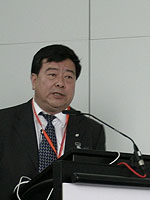 |
"China's booming economy
faces several energy challenges. Among
them, the dependency on oil imports, the
pollution caused by excessive use of coal
power plants and the emission of greenhouse
gases. To cope with these challenges,
the "Law for renewable energy"
will be put into force on January 1 2006.
A major effort is made in the automotive
sector, especially for the Olympic Games
in 2008 and the EXPO in 2010."
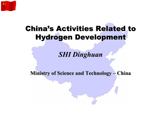
Click to
download the presentation and more information
about Mr. Shi Dinghuan
|
| |
|
| 11.20-11.30 a.m. |
Discussion |
| |
|
11.30-11.50 a.m.
 |
Utsira - demonstrating
the hydrogen society on renewable terms
Knut Harg, Senior
Vice President, Managing Director
Hydro,
Electrolysers, Norway |
 |
"Utsira is not only the
name of an island 20km off the east-coast
of Norway, it also stands for "Utility
Systems in Remote Areas". This project
is a full scale demo installation of a
wind-powered Hydrogen system. 10 households
are supplied with energy created by two
600 kW wind turbines. The energy demand
for two days can be stored as hydrogen,
so that in windless times a Fuel Cell
can stand in. The system is completely
remote controlled and operates at about
90% annual efficiency."
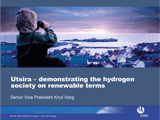
Click to download
the presentation and more information
about Knut Harg
|
| |
|
| 11.50-12.00 p.m. |
Discussion |
| |
|
| 12.00-13.00 p.m. |
Business Lunch |
|
| |
|
|
| |
|
13.00-13.20 p.m.
 |
Japan’s hydrogen and fuel
cells projects
Akiteru
Maruta, Project Manager Research &
Development Department
Technova
Inc., Japan |
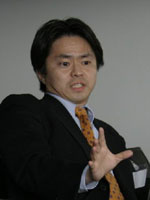 |
"Japan is highly dependent
on energy imports and therefore needs
energy diversity. The challenging target
set by the METI is to have 15 Mio. Fuel
Cell vehicles in 2030. But in my opinion,
stationary Fuel Cells are much closer
to market readiness. Their successfull
introduction will provide positive impulses
for the automotive sector as well. Public
acceptance for Hydrogen & Fuel Cells
is wide, especially because of Toyota's
engagement. This gives people convidence
in the technology."
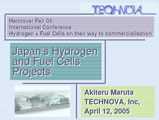
Click
to download the presentation and more
information about Akiteru Maruta
|
| |
|
| 13.20-13.30 p.m. |
Discussion |
| |
|
13.30-13.50 p.m.
 |
Canadian H2 program perspective
Dr. Hugo
Vandenborre
Member of the Hydrogenics Corporation Board
of Directors
Chairman of the Board of Directors and Executive
Vice President of Stuart
Energy Corporation, Canada |
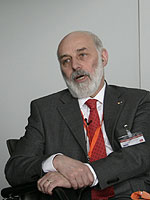 |
"The national not-for-profit
organisation "Fuel Cells Canada"
is currently working on three main projects:
the Hydrogen village in Toronto, the Vancouver
Fuel Cell vehicle program and the Hydrogen
highway project.
Hydrogenics' 7, 10, 20 and 65 kW units
cover a whole range of applications. The
HyPM Power Module offers both versatility
and performance. Built into a fork-lift
truck, it is highly competitive against
lead-acid batteries."
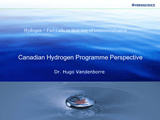
Click to
download the presentation and more information
about Dr. Hugo Vandenborre
|
| |
|
| 13.50-14.00 p.m. |
Discussion |
| |
|
| 14.00-14.30 p.m. |
Coffee break |
| |
|
14.30-14.50 p.m.
 |
Experience with the
creation of the world’s first hydrogen
economy (ECTOS)
Prof.
Thorsteinn I. Sigfusson, Member of the
Board
Icelandic
New Energy Ltd., University
of Iceland, Iceland |
 |
"The ECTOS project in
Reykjavik runs 3 DaimlerChrysler Fuel
Cell busses and is funded by the European
Union. An incident with a malfunctioning
cooling loop prooved to be a valuable
lesson for interaction with the authorities.
45.000 km were driven in 2004, a survey
showed over 90% of public acceptance for
the new fuel. My conclusion is:
- Being independent of fossil
fuel imports could be realised in Iceland
during the next decades
- Projects like ECTOS will
provide information for next steps
- Together, it is possible
to create a Hydrogen society"
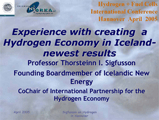
Click
to download the presentation and more
information about Prof. Thorsteinn I.
Sigfusson
|
| |
|
| 14.50-15.00 p.m. |
Discussion |
| |
|
15.00-15.20 p.m.
 |
Global commercialization
of Fuel Cell Energy’s DFC power plant
products
Jerry
D. Leitman, President, Chief Executive
Officer and Director
FuelCell
Energy, Inc., USA |
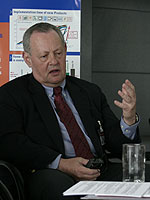 |
"FuelCell Energy considers
itself as being the #1 high temperature
stationary Fuel Cell manufacturer and
developer. The core products are high
temperature, high efficiency, carbonate
Fuel Cell power plants for base load commercial
and industrial applications. From our
point of view, it is illusionary to expect
that people are going to pay more for
electricity just because it is "green".
But the premium is dropping rapidly and
the positive attributes of Fuel Cells
make good selling propositions.
My Conclusion would be:
- Distributed trigeneration
of electricity, heat and Hydrogen is
attractive
- Current technology is competitive
with small scale/distributed Hydrogen
production
- Future developments have
potential to make fuel cell produced
hydrogen the preferred method of supply"
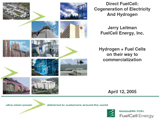
Click to download
the presentation and more information
about Jerry D. Leitman
|
| |
|
|
| |
|
| 15.20-15.30 p.m. |
Discussion |
| |
|
|
| 15.30-16.00 p.m. |
Panel Discussion with all speakers:
A lively discussion between the speakers
was started, also involving the audience.
Subjects were taken from the speakers' presentations
and involved the continued need for field
testing, the importance of governmental
support in the area of Fuel Cell marketing
and codes & standards. Which kind of
Fuel Cell application, stationary, automotive
or mobile, is most likely to achieve the
first breakthrough in commercialisation
was also under serious discussion. Moderator
Ulrich Walter was looking forward to the
next International Conference "Hydrogen
+ Fuel Cells on their way to commercialisation
II" were these and other topics can
be updated and extended.
Please make a note of the date:
April 25, 2006 10 am |
| |
|
| 16.00-18.00 p.m. |
All conference attendees took
the opportunity to visit the Group
Exhibit Hydrogen + Fuel Cells in Hall
13 (see
Orientation) |
|
| |
|
| 18.00-21.00 p.m. |
They used the unique opportunity
to meet with international H2/FC industry
leaders and executives at the center of
the Group Exhibit Hydrogen + Fuel Cells,
joining a Networking
evening including a buffet and drinks
|
Click
here for International Conference 2002
Click
here for International Conference 2001
Click
here for International Conference 2000
|
|
|
|
|
|
|
